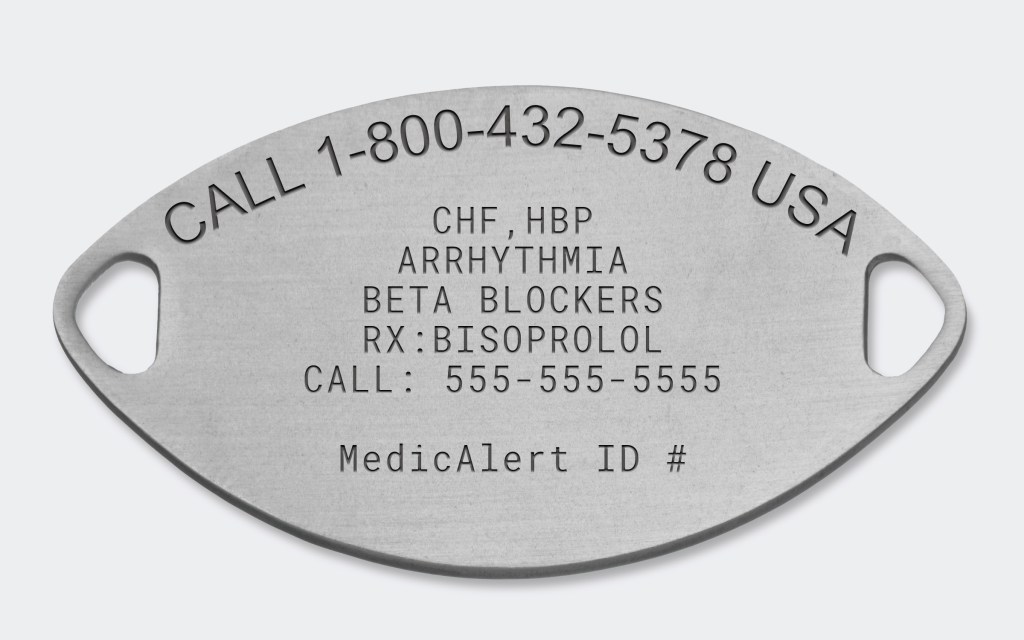It is very important to have a MedicAlert membership! I am diabetic and I have heart problems — this service helps me feel safe!
Mitchell L., living with heart disease and diabetes

Medical IDs for Beta Blockers
The confidence to live with beta blockers
Beta-adrenergic blocking agents, or “beta blockers,” are some of the most commonly prescribed medications for conditions that affect the heart and circulatory system. These life-saving drugs are also commonly used in topical form to treat certain types of glaucoma—the leading cause of blindness worldwide—and “off-label” for anxiety, migraines, and tremors. Off-label means the drug is being prescribed for a different condition or at a different dosage than approved by the U.S. Food and Drug Administration (FDA).
While beta blockers have many uses and benefits, drug interactions can occur. This is true for both prescription medications and over-the-counter (OTC) medicines. Examples include non-steroidal anti-inflammatory drugs (NSAIDs) such as naproxen (Aleve) and ibuprofen (Advil), other drugs that are used to treat hypertension (high blood) such as lisinopril (Zestril) and amlodipine besylate (Norvasc), and blood thinners such as warfarin (Jantoven).
When a drug interaction occurs, it can cause everything from dangerous drops and spikes in blood pressure to bleeding and severe infections.
This is why people who are using these drugs should wear a MedicAlert medical ID for beta blockers.
How MedicAlert protects those living with beta blockers
One thing you shouldn’t worry about is what could happen if there’s an emergency. MedicAlert’s protection plans offer benefits that extend beyond the ID, providing safety and peace of mind for people living with beta blockers, their families and caregivers.

24/7 Emergency Response
Our team provides first responders the information they need to provide fast, accurate care.

Digital Health Profile
All your vital information, all in one place for you and your caregiver.

Emergency Contact Notification
In an emergency, we connect families so that no one is alone in a crisis.

Patient Instructions
Share the information that’s important to your care, such as use of rescue medications or contraindication for tests like MRIs.
Pair a medical ID for beta blockers with the protection plan that’s right for you.
What exactly are beta blockers?
Beta blockers are a class of medications that inhibit the action of the hormone and neurotransmitters epinephrine, also known as adrenaline, and norepinephrine, also known as noradrenaline. Both adrenaline and noradrenaline make the heart beat faster and with more force. Beta blockers work by blocking these hormones, causing the heart to beat more slowly and with less force. This reduces blood pressure and the strain on the heart. Beta blockers also widen veins and arteries to improve blood flow.
Approximately 30 million adults in the U.S. use beta blockers. These prescription-only drugs can be administered orally (by mouth), intravenously (by needle or tube), or topically (applied directly to the skin or eyes). However, beta blockers are most commonly prescribed for oral use.
Examples of beta blockers taken orally include:
- Acebutolol (brand name Sectral)
- Atenolol (Tenormin)
- Bisoprolol (Zebeta)
- Carvedilol (Coreg)
- Metoprolol (Lopressor, Toprol XL)
- Nadolol (Corgard)
- Nebivolol (Bystolic)
- Propranolol (Inderal, InnoPran XL)
For which conditions are beta blockers prescribed?
Beta blockers are primarily used to treat common heart and cardiovascular diseases, including high blood pressure (hypertension), congestive heart failure, abnormal heart rhythms (arrhythmias), and chest pain (angina). They may also be prescribed for glaucoma, anxiety, migraines, certain types of tremors, or an overactive thyroid (hyperthyroidism).
What are the advantages of beta blockers?
Beta blockers are effective for a wide range of cardiovascular problems, they interact well with certain other blood pressure medications such as ACE inhibitors and calcium channel blockers, and their impact is well understood from extensive clinical trials.
Beta blockers are relatively inexpensive, well-tolerated, and have been shown to have health benefits outside of helping the circulatory system and heart. For example, beta blockers have protective benefits for the bones. They prevent the kidneys from excreting calcium into urine and block stress hormones that could cause bone loss. In one study, beta blocker use reduced the risk of osteoporotic fracture in men and women by 50%.
What to engrave on MedicAlert medical IDs for beta blockers:
MedicAlert offers free custom engraving on all our beta blocker bracelets and medical ID products. Engravings on medical IDs for beta blockers should include any critical medical information that can protect and save lives in an accident or medical emergency, for example:
- Beta blockers, other medications
- Implanted devices, such as a coronary stent or pacemaker
- Medical conditions
- Allergies
- Any critical medical information that needs to be communicated to first responders

Sample engraving. Consult our team if you need help engraving your medical ID for beta blockers.
What are the potential side effects from beta blockers?
While beta blockers are well-tolerated and generally considered safe, they can still cause side effects in some individuals. When side effects do occur, the most common include:
- Cold hands or feet (beta blockers can affect the blood supply to your fingers and toes).
- Difficulty sleeping or nightmares (beta blockers can suppress deep sleep or rapid eye movement – REM).
- Fatigue (a slower heart rate can make you tired).
- Feeling sick (upset stomach).
- Feeling dizzy, tired, lightheaded (if your heart rate slows too much).
- Weight gain (beta blockers can slow metabolism).
Rare side effects of beta blockers use include:
- Chest pain
- Depression
- Irregular heartbeat
- Shortness of breath, with or without cough
- Swollen ankles or legs
- Trouble sleeping
- Yellow skin or eyes
- Wheezing or tightening of the chest.
If you experience any of these rare, but serious side effects from using beta blockers, contact your doctor immediately. These side effects could be a sign of lung, liver, or other heart problems.
How should you manage the use of beta blockers?
Beta blockers aren’t for everyone. While they have many benefits, beta blockers interact with a wide range of medications and conditions, so it is important to discuss all of your medications and medical conditions with your doctor before starting a treatment plan that includes beta blockers. This is especially important for people living with asthma or lung disease, certain types of arrhythmias, slow heart rate or low blood pressure, blood circulation problems in the limbs, low blood sugar (hypoglycemia), and those who have had past allergic reactions to beta blockers.
The National Health Service states that you should talk to your doctor before using beta blockers if you are taking:
- Blood thinners
- Medicines for allergies, such as ephedrine, noradrenaline, or adrenaline
- Medicines for asthma or COPD (chronic obstructive pulmonary disease)
- Medicines for diabetes, particularly insulin – beta blockers may make it more difficult to recognize the warning signs of low blood sugar
- Medicines to treat nose or sinus congestion, or other cold remedies, including OTC drugs
- NSAIDs including aspirin, ibuprofen, and naproxen. These OTCs can increase your blood pressure
- Other medicines for an irregular heartbeat such as amiodarone (Pacerone) or flecainide (Tambocor)
- Other medicines for high blood pressure. Combining other blood pressure medications with beta blockers can sometimes lower your blood pressure too much
- Other medicines that can lower your blood pressure, including some antidepressants, nitrates (for chest pain), baclofen (Lioresal, a muscle relaxant), medicines for an enlarged prostate gland such as tamsulosin, or Parkinson’s disease medicines such as carbidopa and levodopa combination (Sinemet)
How medical IDs for beta blockers combined with MedicAlert Membership provide peace of mind
If you are using beta blockers, a MedicAlert medical ID can protect you in an emergency and other medical situations. Medical IDs for beat blockers let emergency responders know that you are taking such medication, so certain drugs and other substances can be avoided.
In addition to sudden changes in blood pressure, bleeding, and infections, drug interactions can cause dizziness, fainting, allergic reactions, and other dangerous side effects.
When you add a MedicAlert protection plan to your MedicAlert medical ID for beta blockers, you will have an added layer of protection in emergencies and other medical-related situations.
- We’re your voice: If you can’t speak for yourself due to a medical emergency, your ID will speak for you – informing others about your use of beta blockers and any other medications you’re taking.
- 24/7 emergency protection: In an emergency, the MedicAlert team will relay all of your critical medical information to first responders, no matter where or when your emergency happens.
- Always connected: You should never be alone in an emergency. That’s why MedicAlert will reach out to your designated contacts if you are unable to do so.
- Live with peace of mind and confidence: MedicAlert will be there for you every step of the way. You’ll have the confidence and freedom to live your life with beta blockers, knowing we’ve got you covered.
DISCLAIMER: THIS WEBSITE DOES NOT PROVIDE MEDICAL ADVICE. The information in this article is presented for educational purposes only and is not intended as a substitute for professional medical advice, diagnosis and treatment. Always seek the advice of a physician or other qualified healthcare provider for any questions you may have regarding a medical condition or treatment.







